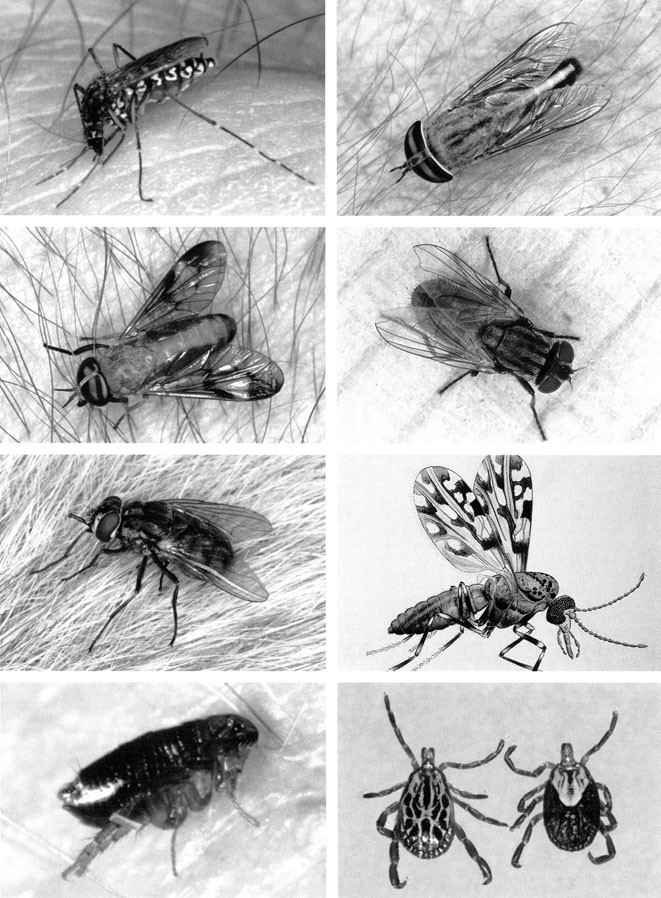Veterinary insects are arthropods that have an impact on animal health by functioning as parasites, disease vectors, or causing irritation and allergies. Flies, ticks, lice, fleas, mites, and mosquitoes are among the key groups that can spread diseases such as heartworm, Lyme disease, and mange, as well as causing anemia and skin problems. Veterinary entomology manages pests to protect the health of cattle, pets, and wildlife using methods such as insecticides, integrated pest control, and disease prevention tactics.
Table of Contents
Veterinary Insects

Veterinary entomology, or the study of insects that affect animal health, is critical for understanding how different insects and arthropods affect the health of domesticated animals, wildlife, and cattle. These insects might be parasites, disease vectors, or cause discomfort and allergies.
Groups of Veterinary Insects
Here’s an introduction to some key groups of veterinary insects:
1. Flies (Diptera)
- Biting Flies: Flies like Stomoxys calcitrans (stable fly) and Haematobia irritans (horn fly) can inflict painful bites, discomfort, and stress in mammals.
- Non-biting Flies: House flies (Musca domestica) and face flies (Musca autumnalis) do not bite, but they can transmit infections such as germs and viruses through contact with open wounds or mucous membranes.
- Bot Flies: Oestrus ovis (sheep nasal bot fly) and Gasterophilus species (horse bot fly) deposit eggs on animals, and the larvae burrow into tissues, causing discomfort, infections, and even nasal obstructions.
2. Ticks (Ixodida)
Ticks are arachnids that transmit Lyme disease, babesiosis, and anaplasmosis. Important tick species in veterinary medicine include Rhipicephalus sanguineus (brown dog tick) and Ixodes scapularis (deer tick). They cling to animals and feed on blood, which can cause anemia, discomfort, and secondary illnesses.
3. Lice (Phthiraptera)
Lice infest both large and small animals, causing discomfort, itching, and even anemia in severe infestations. Lice are species-specific, thus those that infest cattle, horses, or sheep will not infect dogs or cats. Two major types are:
- Sucking lice (Anoplura) suck on blood.
- Chewing lice (Mallophaga) feed on skin detritus.
4. Mites (Acari)
Mites, like ticks, are arachnids. Some species of veterinary relevance are:
- Sarcoptes Scabiei: Causes sarcoptic mange or scabies in dogs and other mammals, resulting in severe itching and hair loss.
- Demodex spp: Causes demodectic mange in dogs, where the mites reside in hair follicles.
5. Fleas (Siphonaptera)
Fleas are external parasites that cause severe itching, allergies, and secondary diseases. They also serve as carriers for diseases like murine typhus and can spread tapeworms. Ctenocephalides felis, sometimes known as the cat flea, is commonly seen on cats and dogs.
6. Mosquitoes (Culicidae)
Mosquitoes are key carriers of diseases such as heartworm in dogs (borne by Dirofilaria immitis) and West Nile virus. Their bites may cause discomfort and allergic reactions.
7. Other Insects
- Bedbugs (Cimex lectularius) and other biting insects can irritate and worry animals.
- Blister Beetles: Certain beetles produce toxins (cantharidin), which can cause poisoning in horses if consumed through contaminated feed, resulting in gastrointestinal and urinary issues.
Key Roles of Veterinary Insects
- Parasites: Many insects directly parasitize mammals by feeding on their blood, skin, or tissues, causing discomfort, blood loss, and secondary illnesses.
- Vectors of Disease: Some insects spread diseases caused by viruses, bacteria, or protozoa. Mosquitoes, for example, carry heartworm to dogs, but ticks transmit Lyme illness.
- Allergens: Repeated bug bites can trigger allergic reactions, particularly flea-bite dermatitis in pets.
Management and Control
Veterinary entomology focuses on both chemical and non-chemical approaches of controlling insect populations, including:
- Insecticides: Topical or systemic treatments for lice, fleas, and ticks.
- Integrated pest management (IPM): To minimize insect populations, combine biological controls (for example, predatory insects or parasites), environmental management, and limited chemical use.
- Vaccine and Treatment: In circumstances when insects are disease vectors, vaccination (for example, heartworm prevention) or preventive therapies are essential.
Understanding the functions insects play in animal health allows veterinarians to design efficient prevention and management measures for the diseases and pain they cause.
Frequently Asked Questions
What are veterinary insects?
Veterinary insects are insects and arthropods that have a direct or indirect impact on the health of animals such as livestock, pets, and wildlife. They can affect people by acting as parasites, disease vectors, or causing irritation and allergies.
What diseases do veterinary insects transmit?
Veterinary insects can spread a variety of diseases, including:
Heartworm illness (transmitted by mosquitoes).
Lyme illness (transmitted by ticks)
Babesiosis (transmitted by ticks).
Mites induce mange.
Flea-borne illnesses, such as tapeworms and flea allergic dermatitis.
Related Articles

